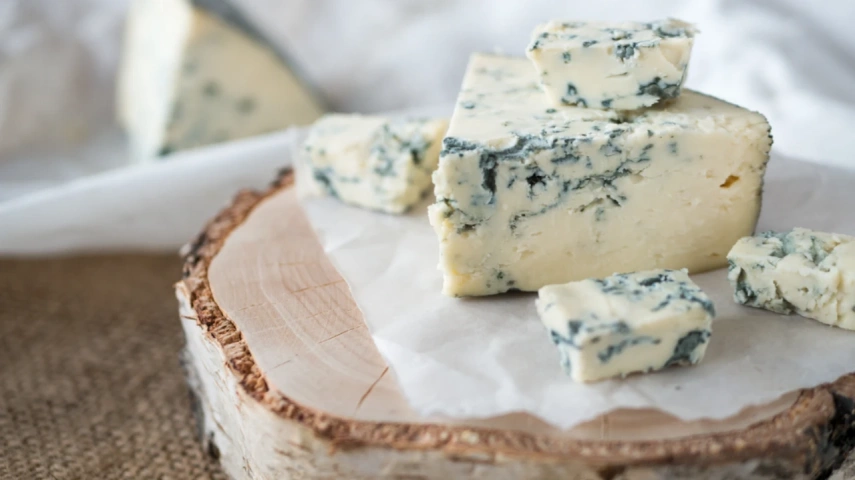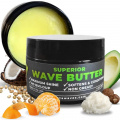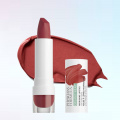An Expert Guide on the Surprising Health Benefits of Blue Cheese
Let us explore the health benefits of blue cheese and learn how it may contribute to a balanced diet, promote bone health, and ensure a healthy gut.

Renowned for its rich flavor and distinct appearance with blue or green veins; the health benefits of blue cheese may surprise you. Despite being perceived as an indulgent treat, this cheese variety offers more than just taste bud satisfaction. Our contributor Corrigan Duffy, Chef and food blogger explains, “Cheese is often considered an indulgent treat due to its rich and savory flavors, high calorie content, and association with special occasions, making it a food people may enjoy in moderation as a satisfying treat rather than a regular dietary staple.”
Let's delve into the unexpected advantages that blue cheese can bring to your overall well-being. It's a decent source of protein, which is crucial for building and repairing tissues. Additionally, blue cheese provides essential minerals like calcium and phosphorus, promoting strong bones and teeth. Our contributor Corrigan Duffy, provides insights into the nutritional value of calcium, saying, “Cheese, in moderation, can be a source of calcium and protein which are beneficial for bones, but its high saturated fat content means it should be consumed in the context of a balanced diet.”
One fascinating aspect of blue cheese is its creation process. The characteristic mold in blue cheese, such as penicillium roqueforti, not only contributes to its unique appearance but also introduces beneficial bacteria (1). According to Dt. Nisha, Consultant Nutritionist and Dietitian at Motherhood Hospital, Gurugram, “Some bacteria are indeed good for you. In the context of blue cheese, certain types of bacteria, referred to as probiotics, can be beneficial for health. These probiotics, such as Penicillium roqueforti, are present in blue cheese and can contribute to a healthy gut microbiome. Probiotics are live microorganisms that provide various health benefits when consumed in adequate amounts. They can help maintain a balanced gut environment, aid in digestion, support nutrient absorption, and even have potential immune-modulating effects. Probiotics are commonly found in fermented foods like yogurt, kefir, kimchi, sauerkraut, and certain types of cheeses, including blue cheese.” These bacteria, often associated with probiotic properties, can aid in maintaining a healthy gut microbiome (1).
What Is Blue Cheese
We may have wondered what is blue cheese and how is blue cheese made due to its uniqueness. Blue cheese is a type of cheese characterized by its distinct blue or green veins running throughout its creamy texture. It is made from alone or a combination of cow's, sheep's, or goat's milk. The unique appearance and flavor of blue cheese are a result of the introduction of specific mold spores, typically Penicillium roqueforti or Penicillium glaucum, during the cheese-making process (1).
- To produce blue cheese, the cheese curds are punctured or pierced to allow oxygen to enter. This creates an environment where the mold can grow. As the cheese ages, the mold spreads, forming veins and releasing enzymes that contribute to the cheese's flavor and texture.
- The aging period of blue cheese can vary, ranging from a few weeks to several months or even longer. which results in various and unique flavors that develop, resulting in a pungent, tangy, and sometimes slightly salty taste. The texture can range from crumbly to creamy, depending on the specific variety of blue cheese.
- Blue cheese comes in various types and styles, with popular examples including Roquefort, Gorgonzola, Stilton, and Danish Blue. Each variety has its unique characteristics, influenced by factors such as the type of milk used, the specific mold strains, and the cheese-making techniques employed.
- The origin of blue cheese can be traced back to ancient times. Dt. Nisha further says, “Cheese production is indeed an ancient practice that dates back thousands of years. The process of making cheese is believed to have originated as a way to preserve and store excess milk before the advent of refrigeration. Ancient civilizations, such as those in the Middle East, Europe, and Asia, have been involved in cheese-making for centuries, using various types of milk, methods of fermentation, and aging processes. So, cheese production is indeed a practice with a rich and ancient history.” While there isn't an exact pinpointed moment of its creation, the development of blue cheese is believed to have occurred accidentally.
- The process of making blue cheese involves the introduction of specific mold spores, such as Penicillium roqueforti or Penicillium glaucum, into the cheese. These molds grow and develop characteristic blue or green veins throughout the cheese, giving it its unique appearance and distinct flavor.
- Legend has it that blue cheese was discovered in a cave in France, where mold naturally developed on aging cheeses. The cheese producers noticed the transformation and realized that the cheese had acquired an intriguing taste and aroma.
- This accidental encounter led to the deliberate cultivation of blue mold in cheese-making, giving birth to the creation of blue cheese as we know it today.
- Over time, blue cheese has evolved and diversified, with different countries and regions putting their unique twist on the production process. However, the underlying principle of introducing mold into the cheese remains consistent, resulting in the characteristic blue veins and tangy flavor that blue cheese enthusiasts cherish.
Overall, blue cheese is cherished for its bold flavor, creamy texture, and the unmistakable visual appeal of its blue-green veins, making it a beloved choice for cheese enthusiasts around the world.
What Are the Different Types of Blue Cheese?
Today, blue cheese is enjoyed worldwide, and appreciated for its bold taste and versatility in culinary applications. From crumbled toppings on salads to pairings with fruits, bread, or wine, blue cheese continues to captivate food lovers with its intriguing history and delightful flavors. Let's dive into the wonderful world of blue cheese and explore the different types of blue cheese that exist:
- Roquefort: Picture yourself in the picturesque caves of France, where the legendary Roquefort cheese was born. This blue cheese is crafted from the milk of sheep and boasts a crumbly texture that practically melts in your mouth. Its flavors are intense, with a slightly salty edge that leaves a lasting impression.
- Gorgonzola: Heading over to Italy, we encounter the creamy delight of Gorgonzola. Made from cow's milk, this blue cheese offers a velvety texture that effortlessly spreads on your palate. Gorgonzola tends to have a milder flavor profile. In particular, Gorgonzola Dolce stands out with its sweetness and less pronounced pungency.
- Stilton: Crossing the English Channel, we find Stilton, a beloved blue cheese from the United Kingdom. Known for its crumbly texture, Stilton delivers a complex taste experience. You'll detect nutty undertones intertwined with creamy and slightly tangy notes, creating a harmonious balance of flavors.
- Danish Blue: From the northern lands of Denmark comes the Danish Blue cheese. Made from cow's milk, this blue cheese offers a semi-soft texture that's delightful to slice into. Danish Blue boasts a creamy and mellow flavor, with just a hint of tanginess to keep things interesting.
- Cabrales: Let's journey to the scenic mountains of Spain, where Cabrales blue cheese reigns supreme. Crafted from a blend of cow's, sheep's, and goat's milk, Cabrales showcases a semi-hard texture that crumbles beautifully. Prepare your taste buds for a robust flavor profile with spicy, tangy, and slightly acidic notes dancing on your tongue.
- Bleu d'Auvergne: Yes the name sounds right, it is from France! This French blue cheese is made from cow's milk. It represents a delectable combination of creamy and crumbly textures. The taste experience is bold and captivating, with a powerful yet harmonious blend of spiciness and nuttiness.
- Fourme d'Ambert: Our French journey continues with the exquisite Fourme d'Ambert blue cheese. Crafted from cow's milk, this cheese features a dense and creamy texture that's sure to delight your senses. Expect a mild and slightly fruity flavor profile, making it an approachable choice for blue cheese enthusiasts.
With these distinct types of blue cheese, ranging from intense and crumbly to creamy and mellow, there's a variety to suit every palate. Whether you're a fan of the strong and spicy or prefer a more subtle and balanced experience, the world of blue cheese offers a wide range of flavors to explore and enjoy.
Blue Cheese Nutrition Facts
Here are the approximate nutrition facts per 100 grams (3.5 ounces) of blue cheese (2):
- Calories: 353
- Protein: 21 grams
- Fat: 28 grams
- Carbohydrates: 2 grams
- Fiber: 0 grams
- Calcium: 528 milligrams (53% of the Daily Value)
- Phosphorus: 387 milligrams (39% of the Daily Value)
- Sodium: 1,629 milligrams (68% of the Daily Value)
- Vitamin B12: 2.3 micrograms (95% of the Daily Value)
- Vitamin K: 1.9 micrograms (2% of the Daily Value)
Please note that these values are approximate and can vary depending on the specific brand and manufacturing process of the blue cheese.
What Are the Health Benefits of Blue Cheese?
From providing essential nutrients and supporting bone health to introducing beneficial bacteria for gut health, blue cheese offers a range of surprising benefits. Here are some amazing ten health benefits of blue cheese:
1. Nutrient-rich cheese:
Blue cheese is an excellent source of protein, essential minerals like calcium and phosphorus, and vitamins like B12. These nutrients play crucial roles in supporting overall health, it enhances bone strength, energy production, and brain function (3).
- Protein: Blue cheese also contains a notable amount of protein, which is essential for various functions in the body. Protein is necessary for building and repairing tissues, including muscles, skin, and organs. It also plays a role in the production of enzymes, hormones, and antibodies that support overall immune function.
- Calcium: Blue cheese is a rich source of calcium, a mineral vital for maintaining strong bones and teeth. Adequate calcium intake is essential throughout life to support bone health and prevent fractures.
- Phosphorus: Another mineral found in blue cheese is phosphorus, which works in conjunction with calcium to support bone health. Phosphorus is also involved in energy metabolism, helping convert food into usable energy. Additionally, it plays a role in DNA and RNA synthesis, cell repair, and maintenance of pH balance in the body.
- Vitamin B12: A water-soluble vitamin that is crucial for several bodily functions is found in blue cheese. Vitamin B12 mainly helps in the production of red blood cells, promoting proper nerve function, and supporting brain health (3). Adequate intake of vitamin B12 is important for cognitive function, a healthy nervous system, and maintaining energy levels.
Overall, the nutrient profile of blue cheese makes it a valuable addition to a balanced diet. The protein content supports muscle health and immune function, while calcium and phosphorus contribute to strong bones and energy metabolism. Vitamin B12 plays a crucial role in blood and nerve health, aiding in overall well-being.
2. Probiotic properties:
Blue cheese contains beneficial bacteria, such as penicillium roqueforti, which contribute to its distinctive flavor. These bacteria may have probiotic effects, promoting a healthy gut microbiome and aiding in digestion and nutrient absorption (4).
- Beneficial Bacteria: Blue cheese, thanks to the presence of certain strains of beneficial bacteria like Penicillium roqueforti, exhibits probiotic properties. Probiotics are live microorganisms that confer health benefits when consumed in adequate amounts. Here's how the probiotic properties of blue cheese can support a healthy gut microbiome and enhance digestion
- Healthy Gut Microbiome: Blue cheese contains live bacteria that can populate the gut with beneficial microbes. These bacteria help maintain a balanced and diverse gut microbiome, which is essential for overall digestive health and immune function.
- Improved Digestion: The presence of probiotics in blue cheese can aid in digestion by breaking down certain components of food that the body may have difficulty digesting on its own. This can include the breakdown of lactose in individuals with lactose intolerance, as some blue cheeses are lower in lactose content compared to other dairy products.
- Nutrient Absorption: Probiotics in blue cheese can enhance the absorption of nutrients by promoting a healthy gut lining. They may increase the surface area of the intestinal wall and improve the function of the microvilli, tiny finger-like projections that absorb nutrients from digested food.
- Reduced Digestive Issues: The beneficial bacteria can help modulate gut inflammation, improve stool consistency, and enhance overall gut function.
It's important to note that not all blue cheeses contain the same strains or quantities of probiotics, as the manufacturing process and specific cheese variations can impact the probiotic content. Additionally, individual responses to probiotics can vary. If you're seeking specific probiotic benefits, it may be beneficial to choose blue cheeses labeled as containing live or active cultures or consider other sources of probiotics, such as fermented foods or probiotic supplements.
3. Bone health:
Blue cheese's calcium and phosphorus content supports bone health. Blue cheese can contribute to bone health due to its calcium and phosphorus content. Here's how these minerals support the skeletal system (5):
- Calcium: Blue cheese is a good source of calcium, a mineral that plays a vital role in maintaining strong bones and teeth. Calcium is the primary building block of bones, providing strength and structure. Calcium is also involved in muscle function, nerve transmission, and hormone secretion.
- Phosphorus: Alongside calcium, phosphorus is another essential mineral for bone health. It works synergistically with calcium to form the mineral structure of bones and teeth. Adequate phosphorus intake is necessary for optimal bone mineralization and remodeling processes.
Due to the combination of calcium and phosphorus, It's recommended to consume blue cheese as part of a balanced diet that includes other calcium-rich foods and to ensure adequate vitamin D intake, which helps optimize calcium absorption.
4. Dental health:
Calcium and phosphorus are also important for dental health, as they contribute to tooth strength and enamel integrity. Blue cheese can indeed contribute to dental health due to its calcium and phosphorus content, which play essential roles in tooth strength and enamel integrity (6). Here's how blue cheese can promote oral health:
- Calcium for Tooth Strength: Blue cheese's calcium content helps in the formation and maintenance of strong teeth. Calcium is a key component of tooth structure, contributing to its hardness and strength. Adequate calcium intake supports the development of healthy teeth during childhood and helps maintain tooth integrity throughout life.
- Phosphorus for Enamel Integrity: Phosphorus, found in blue cheese, is another mineral crucial for dental health. It works in synergy with calcium to form hydroxyapatite, a mineral complex that makes up tooth enamel. Phosphorus helps to strengthen and protect tooth enamel, it is the outer and the hardest layer of the teeth that serve as a protective barrier against tooth decay and sensitivity.
- Saliva Stimulation: Blue cheese's tangy flavor and texture can stimulate saliva production. Saliva helps neutralize acids in the mouth, remineralize tooth enamel, and wash away food particles and bacteria. The natural saliva production stimulated by consuming blue cheese helps maintain a healthy oral environment by rinsing the mouth and reducing the likelihood of dental problems like tooth decay and cavities.
- Antibacterial Properties: Blue cheese may have antibacterial properties due to the presence of certain compounds and bacteria. The potential antibacterial effects of blue cheese can help hinder the growth of harmful oral bacteria, potentially lowering the risk of gum disease and tooth decay.
While blue cheese can offer potential benefits for dental health, it's important to note that consuming it as part of an overall balanced diet and practicing good oral hygiene habits are crucial. Regular brushing, flossing, and dental check-ups remain essential for maintaining optimal oral health. Including blue cheese in your diet may help promote oral health.
5. Vitamin B12 source:
Blue cheese is a significant source of vitamin B12, a nutrient primarily found in animal products (7). Blue cheese serves as a notable source of vitamin B12, a nutrient predominantly present in animal-derived foods. Vitamin B12 plays several critical roles in maintaining overall health:
- Nerve Function: Vitamin B12 is essential for proper nerve function. It aids in the production of myelin, a protective sheath that surrounds and insulates nerve fibers, allowing for efficient nerve signal transmission. Adequate vitamin B12 levels support optimal neurological function and help prevent nerve damage (8).
- DNA Synthesis: It plays a vital role in the formation and maturation of red blood cells, ensuring healthy blood cell production (8). Sufficient vitamin B12 levels support proper cell division and overall cellular function.
- Red Blood Cell Production: Vitamin B12 is essential for the synthesis of red blood cells, which are responsible for delivering oxygen to body tissues. It helps prevent anemia (8).
Including blue cheese in the diet can provide a source of vitamin B12, particularly for individuals following a vegetarian or vegan diet who may have limited access to animal-based sources of this nutrient. Adequate vitamin B12 intake is crucial for individuals of all dietary preferences to support nerve health, DNA synthesis, and red blood cell production.
Therefore, it is advisable to check nutrition labels or seek information from manufacturers for more accurate information about the vitamin B12 content in a particular blue cheese product. Consulting nutrition labels or seeking information from manufacturers can provide more precise vitamin B12 content per serving.
6. Antioxidant properties:
Blue cheese contains selenium, an essential trace mineral known for its antioxidant properties. Here's how the selenium in blue cheese can contribute to overall health and provide antioxidant benefits:
- Free Radical Protection: Selenium acts as an antioxidant in the body, helping to neutralize harmful free radicals. Free radicals are unstable molecules that can cause oxidative damage to cells and tissues (9).
- Cellular Defense: Selenium plays a crucial role in the body's natural defense mechanisms at the cellular level. It helps prevent cellular damage caused by oxidative stress. These enzymes work to maintain the balance between antioxidants and free radicals, contributing to overall cell health (9).
- Immune System Support: Selenium also plays a role in supporting a healthy immune system. It helps regulate immune responses. Adequate selenium intake promotes optimal immune function and helps maintain overall immune health (9).
7. Disease Risk Reduction:
Blue cheese helps reduce the risk of diseases.
- Reduced Risk of Chronic Diseases: The antioxidant activity of selenium in blue cheese has been associated with a reduced risk of chronic diseases. Selenium's protective effects against oxidative stress and inflammation contribute to its potential role in disease prevention (9).
The selenium content may also vary between different types and brands of blue cheese. Incorporating blue cheese as part of a varied and balanced diet, along with other selenium-rich foods, can help ensure adequate selenium intake and provide antioxidant benefits.
8. Potential anti-inflammatory effects:
Blue cheese contains compounds such as peptides and fatty acids, and may possess anti-inflammatory properties (10). These properties could potentially contribute to reducing inflammation in the body. The consumption of blue cheese, with its bioactive compounds, may positively influence the gut microbiota composition, promoting a healthier balance and potentially reducing inflammation in the body.
9. Appetite control:
The high protein content of blue cheese may help promote feelings of fullness and satiety. Including moderate amounts of blue cheese in meals or snacks can aid in appetite control and support weight management goals (11). Here's how including moderate amounts of blue cheese in meals or snacks can aid in appetite control:
- Satiety and Fullness: Protein is known to promote feelings of satiety and fullness. It takes longer to digest compared to carbohydrates, helping you feel satisfied for a longer duration after consuming a meal. Blue cheese, with its protein content, can contribute to a sense of satiety, reducing the likelihood of overeating or snacking on unhealthy foods between meals.
- Regulation of Hunger Hormones: Protein-rich foods like blue cheese can affect the release of hunger-regulating hormones in the body. By incorporating blue cheese into your meals or snacks, you can potentially help regulate these hunger hormones, leading to better appetite control.
- Nutrient-Dense Option: Blue cheese not only provides protein but also contains essential nutrients such as calcium and phosphorus. These nutrients contribute to overall nutritional value and can further support appetite control. When you consume a nutrient-dense food like blue cheese, your body receives important nutrients while helping you feel satisfied, reducing the likelihood of seeking out additional snacks or meals.
Opt for smaller portions and pair them with a variety of other nutrient-rich foods to create a balanced meal or snack. Remember to consider individual dietary needs and consult with a healthcare professional or registered dietitian for personalized advice on incorporating blue cheese into your diet for appetite control and weight management.
10. Enhanced flavor and Culinary versatility:
Blue cheese's bold and distinct flavor can elevate the taste of various dishes, making nutritious foods more enjoyable. Adding small amounts of blue cheese to salads, vegetables, or whole-grain dishes can enhance their appeal and encourage healthier eating habits. Blue cheese's rich and tangy flavor lends itself to a wide range of culinary applications. From dressings and dips to pizza toppings and cheese boards, blue cheese can add a flavorful twist to many dishes, making healthy eating more exciting and satisfying.
Conclusion:
Blue cheese offers not only a distinct and delicious flavor but also several potential health benefits. From being a nutrient-rich food to potentially possessing anti-inflammatory and appetite-controlling properties, blue cheese can be a valuable addition to a balanced diet. It provides essential minerals like calcium and phosphorus for bone and dental health, while its probiotic properties may support a healthy gut microbiome. The antioxidant activity of selenium in blue cheese may help reduce the risk of chronic diseases. However, it's important to consume blue cheese in moderation, be aware of individual dietary needs, and consider the variability in nutrient content between different types and brands. So, indulge as part of a varied and balanced diet to enjoy the flavors and potential health benefits of blue cheese.
Contributor: Corrigan Duffy, Chef and Food Blogger, Corrie Cooks
Sources:
1. FAQ: Microbes Make the Cheese
https://www.ncbi.nlm.nih.gov/books/NBK562892/
2. Preventive Effects of Dairy Products on Dementia and the Underlying Mechanisms
https://www.ncbi.nlm.nih.gov/pmc/articles/PMC6073537/
3. [HISTORICAL RECORD]: BLUE CHEESE
https://fdc.nal.usda.gov/fdc-app.html#/food-details/513446/nutrients
4. Diversity of Lactobacillus Species of Stilton Cheese Relates to Site of Isolation
https://www.ncbi.nlm.nih.gov/pmc/articles/PMC7236593/
5. Healthy bones – Activity and nutrition
https://www.ncbi.nlm.nih.gov/pmc/articles/PMC2795621/
6. The effect of cheese on dental caries: a review of the literature
https://pubmed.ncbi.nlm.nih.gov/1877906/
7. Vitamin B12-Containing Plant Food Sources for Vegetarians
https://www.ncbi.nlm.nih.gov/pmc/articles/PMC4042564/
8. Vitamin B12 Fact Sheet for Consumers
9. Antioxidant Activity of Milk and Dairy Products
https://www.ncbi.nlm.nih.gov/pmc/articles/PMC8833589/
10. Roquefort Cheese Proteins Inhibit Chlamydia pneumoniae Propagation and LPS-Induced Leukocyte Migration
https://www.ncbi.nlm.nih.gov/pmc/articles/PMC3655667/
11. Effect of a high intake of cheese on cholesterol and metabolic syndrome: results of a randomized trial





 JOIN OUR WHATSAPP CHANNEL
JOIN OUR WHATSAPP CHANNEL
































































































